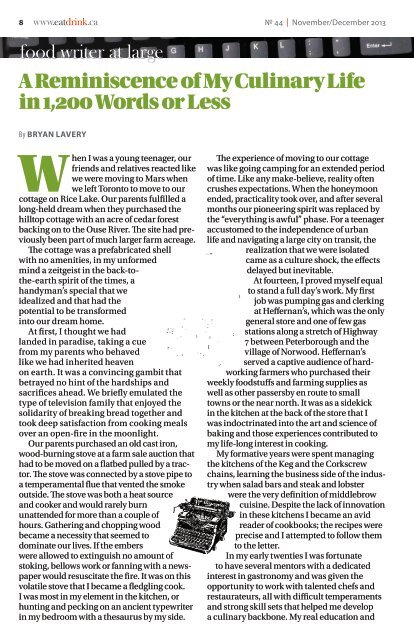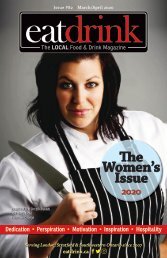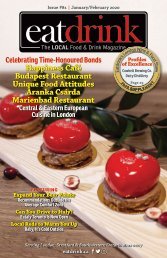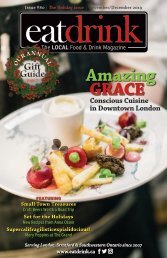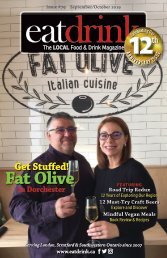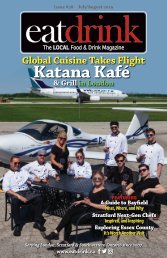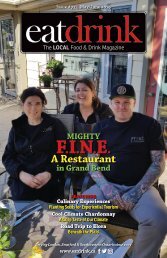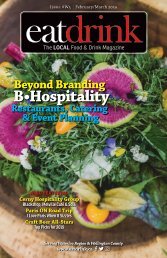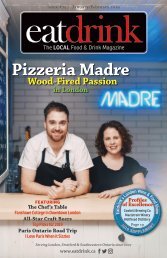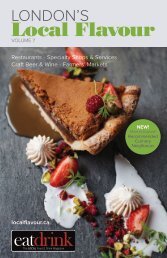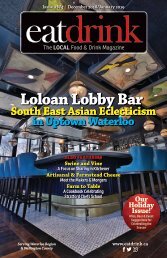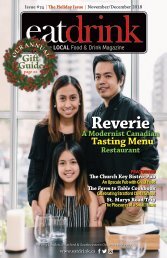Eatdrink #44 November/December 2013
The LOCAL food and drink magazine serving London, Stratford and Southwestern Ontario since 2007.
The LOCAL food and drink magazine serving London, Stratford and Southwestern Ontario since 2007.
You also want an ePaper? Increase the reach of your titles
YUMPU automatically turns print PDFs into web optimized ePapers that Google loves.
8 www.eatdrink.ca<br />
№ 44 | <strong>November</strong>/<strong>December</strong> <strong>2013</strong><br />
food writer at large<br />
A Reminiscence of My Culinary Life<br />
in 1,200 Words or Less<br />
By Bryan Lavery<br />
When I was a young teenager, our<br />
friends and relatives reacted like<br />
we were moving to Mars when<br />
we left Toronto to move to our<br />
cottage on Rice Lake. Our parents fulfilled a<br />
long-held dream when they purchased the<br />
hilltop cottage with an acre of cedar forest<br />
backing on to the Ouse River. The site had previously<br />
been part of much larger farm acreage.<br />
The cottage was a prefabricated shell<br />
with no amenities, in my unformed<br />
mind a zeitgeist in the back-tothe-earth<br />
spirit of the times, a<br />
handyman’s special that we<br />
idealized and that had the<br />
potential to be transformed<br />
into our dream home.<br />
At first, I thought we had<br />
landed in paradise, taking a cue<br />
from my parents who behaved<br />
like we had inherited heaven<br />
on earth. It was a convincing gambit that<br />
betrayed no hint of the hardships and<br />
sacrifices ahead. We briefly emulated the<br />
type of television family that enjoyed the<br />
solidarity of breaking bread together and<br />
took deep satisfaction from cooking meals<br />
over an open-fire in the moonlight.<br />
Our parents purchased an old cast iron,<br />
wood-burning stove at a farm sale auction that<br />
had to be moved on a flatbed pulled by a tractor.<br />
The stove was connected by a stove pipe to<br />
a temperamental flue that vented the smoke<br />
outside. The stove was both a heat source<br />
and cooker and would rarely burn<br />
unattended for more than a couple of<br />
hours. Gathering and chopping wood<br />
became a necessity that seemed to<br />
dominate our lives. If the embers<br />
were allowed to extinguish no amount of<br />
stoking, bellows work or fanning with a newspaper<br />
would resuscitate the fire. It was on this<br />
volatile stove that I became a fledgling cook.<br />
I was most in my element in the kitchen, or<br />
hunting and pecking on an ancient typewriter<br />
in my bedroom with a thesaurus by my side.<br />
The experience of moving to our cottage<br />
was like going camping for an extended period<br />
of time. Like any make-believe, reality often<br />
crushes expectations. When the honeymoon<br />
ended, practicality took over, and after several<br />
months our pioneering spirit was replaced by<br />
the “everything is awful” phase. For a teenager<br />
accustomed to the independence of urban<br />
life and navigating a large city on transit, the<br />
realization that we were isolated<br />
came as a culture shock, the effects<br />
delayed but inevitable.<br />
At fourteen, I proved myself equal<br />
to stand a full day’s work. My first<br />
job was pumping gas and clerking<br />
at Heffernan’s, which was the only<br />
general store and one of few gas<br />
stations along a stretch of Highway<br />
7 between Peterborough and the<br />
village of Norwood. Heffernan’s<br />
served a captive audience of hardworking<br />
farmers who purchased their<br />
weekly foodstuffs and farming supplies as<br />
well as other passersby en route to small<br />
towns or the near north. It was as a sidekick<br />
in the kitchen at the back of the store that I<br />
was indoctrinated into the art and science of<br />
baking and those experiences contributed to<br />
my life-long interest in cooking.<br />
My formative years were spent managing<br />
the kitchens of the Keg and the Corkscrew<br />
chains, learning the business side of the industry<br />
when salad bars and steak and lobster<br />
were the very definition of middlebrow<br />
cuisine. Despite the lack of innovation<br />
in these kitchens I became an avid<br />
reader of cookbooks; the recipes were<br />
precise and I attempted to follow them<br />
to the letter.<br />
In my early twenties I was fortunate<br />
to have several mentors with a dedicated<br />
interest in gastronomy and was given the<br />
opportunity to work with talented chefs and<br />
restaurateurs, all with difficult temperaments<br />
and strong skill sets that helped me develop<br />
a culinary backbone. My real education and


